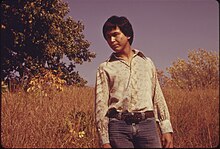Kickapoo Tribe of Indians of the Kickapoo Reservation in Kansas

Ron McKinney (Kickapoo-Potawatomi),
Doniphan County, Kansas (1974) |
|
| Total population | |
|---|---|
| 1,653 (2006) | |
| Regions with significant populations | |
|
|
|
| Languages | |
| English, formerly Kickapoo | |
| Religion | |
| traditional tribal religion, Native American Church, Drum religion | |
| Related ethnic groups | |
| other Kickapoo people and Fox, Sauk, and Shawnee people |
The Kickapoo Tribe of Indians of the Kickapoo Reservation in Kansas is one of three Federally recognized tribes of Kickapoo people. The other Kickapoo tribes in the United States are the Kickapoo Traditional Tribe of Texas and the Kickapoo Tribe of Oklahoma. The Tribu Kikapú are a distinct subgroup of the Oklahoma Kickapoo and reside on a hacienda near Múzquiz Coahuila, Mexico; they also have a small band located in the Mexican states of Sonora and Durango.
The Kansas Kickapoo Tribe owns a gymnasium, day care center, senior center, and the Kickapoo Nation school, which teaches grades from kindergarten through 12th grade.
The Kickapoo Indian Reservation in Kansas is located in Brown County in northeastern Kansas. The reservation is approximately five by six miles (8.0 by 9.7 km) in size or 19,200 acres (78 km2).
The Kickapoo Tribe in Kansas is headquartered in Horton, Kansas. The tribe is governed by an elected Kickapoo Tribal Council. The current administration is:
Members of the Kansas Kickapoo speak English; formerly they spoke the Kickapoo language, which is a Fox language, part of the Algonquian language family. Actually the Fox and the Sauk came from the Kickapoo.
The Tribe owns and operates the Golden Eagle Casino, buffet, and snack bar, located in Horton.
"Kickapoo" comes from their word "Kiwigapawa," which roughly translates into "he moves from here to there." The tribe is part of the central Algonquian group and has close ethnic and linguistic connections with the Sac and Fox. The Kickapoo were first recorded in history in about 1667–70 at the confluence of the Fox and Wisconsin Rivers. Under pressure from the Menominee, the Kickapoo and their allies moved south and west into southern Michigan, northern Iowa, Ohio and Illinois. A treaty dated 7 June 1803 between the U.S. Government and the Delaware, Shawnee, Potawatomi, Miami, Eel River, Wea, Kickapoo, Piankeshaw, and Kaskaskia tribes occupying the country drained by the Ohio, Wabash and Miami Rivers and a subsequent treaty dated 7 August 1803 ceded lands previously granted in the Treaty of Greenville in 1795 by General Anthony Wayne, and Fort Wayne and Vincennes, Indiana. By these treaties and succeeding treaties in 1809, 1815, 1816, 1819, and 1820 the tribe ceded all their lands on the Wabash, White and Vermilion Rivers and moved into Missouri on the Osage River.
...
Wikipedia
